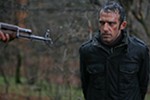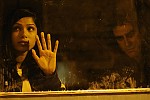 Shadows off the beaten path
Shadows off the beaten pathLOOSE CANNONS | MIRAL
< < F O R E I G N > >
last update 3.Oct.10
See also: SHADOWS FILM FESTIVAL
 R E V I E W B Y R I C H C L I N E
R E V I E W B Y R I C H C L I N E
prd Thanassis Karathanos
with Rafi Pitts, Mitra Hajjar, Saba Yaghoobi, Naser Madahi, Ali Mazinani, Malek Jahan Khazai, Ossta Shah Tir, Gholamreza Rajabzadeh, Ali Nicksaulat, Fatemeh Alijani, Hossein Nickbakht, Shoja'edin Ghanaei

release UK 29.Oct.10
10/Iran 1h30
BERLIN FILM FEST

TORONTO FILM FEST
 Chillingly well-made but also somewhat vague, this Iranian drama explores modern life from a very dark angle. Moody and rather depressing, it's also haunting and utterly involving right to the bitter end.
Chillingly well-made but also somewhat vague, this Iranian drama explores modern life from a very dark angle. Moody and rather depressing, it's also haunting and utterly involving right to the bitter end.
Desperate for a job, Ali (Pitts) settles for a night watchman position that at least gives him time to spend with his wife and 6-year-old daughter (Hajjar and Yaghoobi). But when they go missing one day, his life turns upside down. As an ex-con, Ali feels like he has nothing left to live for and takes out his anger and frustration in a very nasty way. Soon he's on the run from two cops (Madahi and Mazinani) who take very different approaches to their job.
Writer-director Pitts creates a vivid atmosphere on screen, with dense cinematography by Mohammad Davudi and a startling sound mix that layers the ambient noise to maximum effect then punctuates the film with key gunshots. It's skilful filmmaking, and it puts us right into the skin of Ali, taking us on an almost overpoweringly emotional journey. And as an actor, Pitts reveals Ali's inner feelings with almost no dialog at all.
The film's final act is much more difficult, as Ali and the two policemen are lost in the woods, engaging in a tense discussion of morality that contrasts raw pragmatism with the rule of law. One of the cops loves his job and is clearly the kind of man who takes bribes and metes out rough justice, while the other guy is only completing his national service and can see a bigger picture. Their conflict echoes earlier scenes in which people react to news of the upcoming general election. Indeed, Ali's wife and daughter were caught in a clash between police and demonstrators.
In other words, there's rather a lot going on in this film, even though the dialog is minimalistic. Ali barely says anything at all, and yet he's a remarkably complex character we can really feel for, even when he does something inexplicable. And the contrast between the murky morality of the big city and the foggy confusion of the rural forest is striking. We may not quite understand everything that happens, but it gets us thinking. And it really lingers.
31.Aug.10
 R E V I E W B Y R I C H C L I N E
R E V I E W B Y R I C H C L I N E Año Bisiesto
Año Bisiesto
scr Michael Rowe, Lucia Carreras
prd Edher Campos, Luis Salinas
with Monica del Carmen, Gustavo Sanchez Parra, Marco Zapata, Diego Chas, Jaime Sierra, Armando Hernandez, Jose Juan Meraz, Ireri Solis, Nur Rubio, Ernesto Gonzalez, Bertha Mendiola

release UK 26.Nov.10
10/Mexico 1h34
CANNES FILM FEST
TORONTO FILM FEST

 From Mexico, this bold and yet subtle film is so bracingly realistic that at times we begin worrying about the central actress. Without ever making things easy for us, it also has a lot to say about modern life in a big city.
From Mexico, this bold and yet subtle film is so bracingly realistic that at times we begin worrying about the central actress. Without ever making things easy for us, it also has a lot to say about modern life in a big city.
Laura (del Carmen) is a freelance journalist who lives in quiet isolation, barely spending time with anyone else. But she tells her little brother (Zapata) that her life is full of friends. And she lies to everyone else as well. When her loneliness gets too much, she dresses up and heads out to pick up another one night stand for soulless sex. Then one man (Parra) becomes a regular visitor and, as their encounters get more twisted and obsessive, Laura's demands get increasingly intense.
The story takes place over the month of February in a leap year, and Laura counts down the days to the 29th with a mix of expectation and dread. We learn later on what this day means for her, but the film's main strength is in the way it captures the details of her mundane life. It's so dull and sometimes seedy that it's uncomfortable to watch, and yet the raw honesty holds our attention, anchored by a staggeringly authentic performance from del Carmen.
The camera rarely leaves Laura's flat, so what we see of her life is extremely limited, which gives the film a claustrophobic quality. This vividly conveys the sometimes overpowering feeling of seclusion of living in a crowded place. Laura's compulsive lying doesn't help her situation, although it may make her feel better about her monotonous life. And in a way we can see why she tries to spice up her sex life with danger and even violence.
We also get subtle glimpses of her family situation, the pain of grief after the death of her father and a pang of betrayal from her mother. None of this is defined in great detail, but we see the emotions flicker across Laura's face in a way that lets us understand her actions. And despite some slightly pushy plotting, we can vividly see ourselves in her shoes. Which is no mean feat.
29.Sep.10 lff
 R E V I E W B Y R I C H C L I N E
R E V I E W B Y R I C H C L I N E Mine Vaganti
Mine Vaganti
prd Domenico Procacci
scr Ferzan Ozpetek, Ivan Cotroneo
with Riccardo Scamarcio, Nicole Grimaudo, Alessandro Preziosi, Ilaria Occhini, Lunetta Savino, Ennio Fantastichini, Elena Sofia Ricci, Bianca Nappi, Massimiliano Gallo, Carolina Crescentini, Carmine Recano, Paola Minaccioni
 release It 12.Mar.10,
release It 12.Mar.10, US Apr.10 tff, UK 10.Dec.10
10/Italy
BERLIN FILM FEST

 Turkish-born Italian filmmaker Ozpetek branches into comedy with this borderline farce about an estabished family struggling to grapple with the issues of the 21st century. It's bright and smart and ultimately surprisingly moving.
Turkish-born Italian filmmaker Ozpetek branches into comedy with this borderline farce about an estabished family struggling to grapple with the issues of the 21st century. It's bright and smart and ultimately surprisingly moving.
Returning home to Lecce from his studies in Rome, Tommaso (Scamarcio) confides to his older brother Antonio (Preziosi) that he intends to tell his whole family that he's gay, partly to get out of his responsibilities in the family's pasta business. But at dinner that night, Antonio drops his own bombshell, leaving their parents (Savino and Fantastichini) and sister (Nappi) stunned. Their grandmother (Occhini), however, isn't so surprised. Or shaken. Over the next weeks, the fallout continues as Tommaso befriends the sexy, mysterious Alba (Grimaudo) and neglects his boyfriend (Recano) back in Rome.
Ozpetek loves these sorts of family-based movies, with lots of passionate, lively people spiralling around each other. And what makes this film work, besides some strong acting, is the more serious themes the story raises as it explores the conflict between generations at what is clearly a transitional point in cultural history (and not just in Italy). The family patriarch isn't against homosexuality per se, but he's terrified that if his son is openly gay he'll be a laughing stock.
Of course, everyone in this film sees things in a slightly different way. And it's the juxtaposition of three generations that makes things intriguing, especially since Occhini steals the film as the wise woman who knows a thing or two from experience. And Scamarcio is thoroughly engaging as a young guy caught between a rock and a hard place, as it were; his anxiety is a little overplayed, but it's also palpable.
In fine Italian style, most of the key scenes take place at mealtimes, including both the smaller, quiet moments and the bigger farcical events (such as when Tommaso's boyfriend and three very gay pals visit from Rome). But even in the broadest comedy, Ozpetek roots the characters in authenticity. And by keeping the tone light and frothy, he's able to explore an intensely serious issue with refreshing insight and a warmly personal touch.
5.Aug.10
 R E V I E W B Y R I C H C L I N E
R E V I E W B Y R I C H C L I N E
scr Rula Jebreal
prd Jon Kilik
with Hiam Abbass, Freida Pinto, Alexander Siddig, Yasmine Al Massri, Ruba Blal, Omar Metwally, Willem Dafoe, Vanessa Redgrave, Stella Schnabel, Makram J Khoury, Najwa Mubatki, Lana Zreik

release UK 3.Dec.10,
US 25.Mar.11
10/Israel Pathe 1h52
VENICE FILM FEST
TORONTO FILM FEST

 Inventive camerawork and raw performances bring this powerful true story to vivid life. So it's a shame director Schnabel loses his grip in the final act. It's still an important film, but it lacks the badly needed final gut-punch.
Inventive camerawork and raw performances bring this powerful true story to vivid life. So it's a shame director Schnabel loses his grip in the final act. It's still an important film, but it lacks the badly needed final gut-punch.
Although born in the 1970s, Miral (Pinto) traces her life back to Israel's partition in 1948, when the young Hind (Abbass) turned her father's home into an orphanage for Palestinian refugees. Three decades later, Miral becomes a student in Hind's school when her father (Siddig) places her there after the death of her mother (Al Massri). Later as a teen, Miral's relationship with her father and Hind are strained when she develops a crush on handsome freedom fighter Hani (Metwally). And she begins to realise that the path to peace is rather complex.
Miral's name comes from a red flower. "It grows on the side of the road," she says. "You've probably seen millions of them." So this film is, rather unsubtly, positioned as a common story of life over the first 50 years of Israel's nationhood, during which conditions are increasingly oppressive for the Palestinian minority. The big question is whether Palestine should be an independent nation or whether everyone can live in peace in a united country. But as Miral grows up, she realises that both options are merely ideals.
Schnabel tells this strong tale from a deeply human angle, letting the politics emerge organically in conversations. And for the film's first two-thirds, there isn't a false moment, as the astute handheld cinematography by Eric Gautier captures the offhanded, honest performances of the whole cast, anchored by a terrific turn from Pinto. And solid cameos by Redgrave and Dafoe give us points of interest along the way.
Then, just after the film's most promising sequence in which Miral is surprised that she has befriended a Jewish woman (Stella Schnabel), the story abruptly starts wrapping itself up. Scenes feel rushed when they need to let us absorb the situation, important plot points flit by almost unobserved and a couple of moments are awkwardly directed and played. This doesn't diminish the essential vitality of Jebreal's story, but it does leave us unmoved by it.
15.Sep.10


See also: SHADOWS FILM FESTIVAL
© 2010 by Rich Cline, Shadows
on the Wall